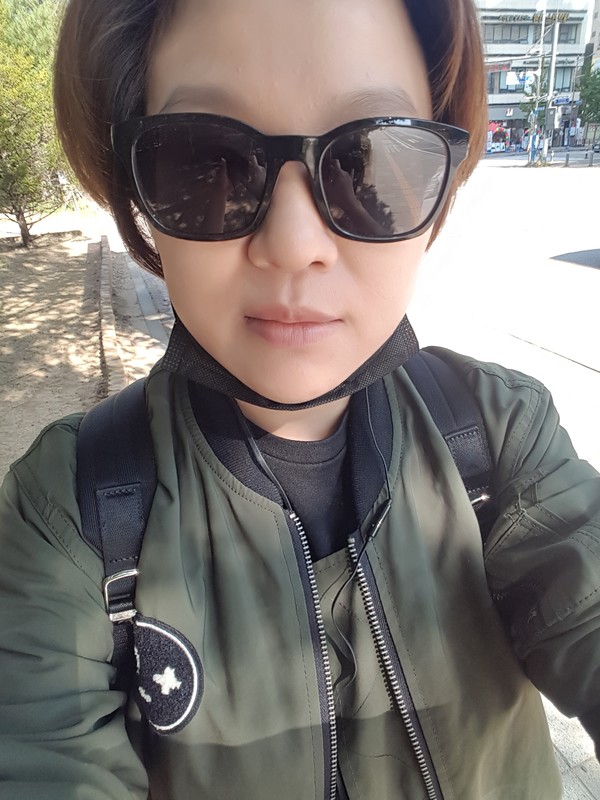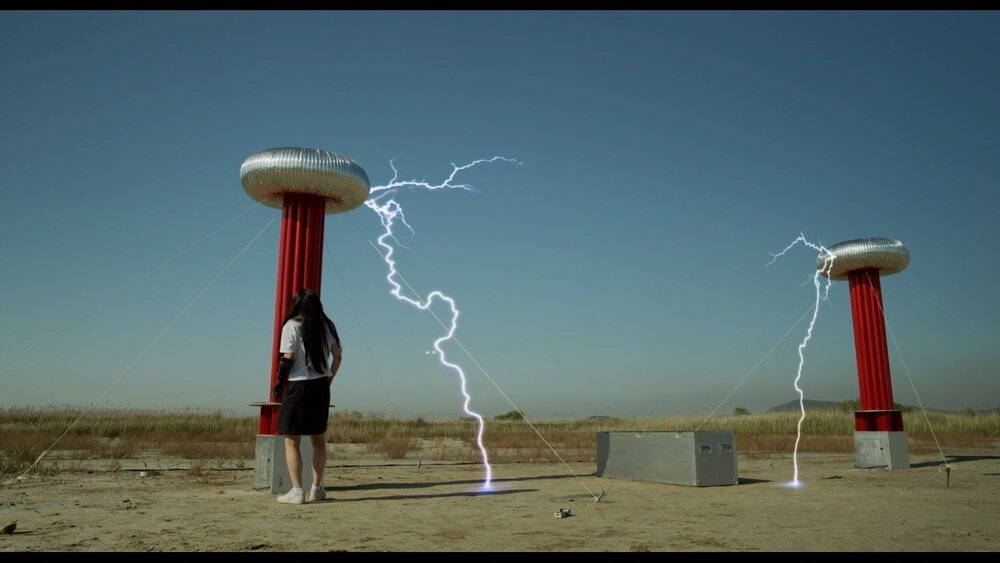Trans is a most unusual and fascinating film, incorporating science fiction, dreams, philosophy, and social commentary. It focuses on a schoolgirl who considers the possibility of becoming transhuman as a way of pushing back against her troubles. Talking to Naeri Do, the writer and director of Trans, was just as fascinating, and unusual for me too: it was the first time I’ve had the opportunity to interview a filmmaker as far away as Korea, so far removed from my own life and experiences; and the first time involving a translator. The conversation was a little tentative, therefore, and Naeri laughed with relief at first that it wasn’t going to be published as a video.
I hadn’t found any information about either Naeri or the film online, apart from the listing for Grimmfest’s Easter Horror Nights (where the UK premiere will be screened), so I asked about her background. Ever since she was in high school, she wanted to be a film director, but didn’t major in any of the arts, and actually majored in philosophy as she had heard it helped in directing and producing. In university, she got involved in plays and theatre work as an actor; and then in external workshops in writing films, she learned about the process. She had a hiatus during which she wrote many scenarios; and then finally, this, Naeri’s first feature film.
It was interesting to hear Naeri’s educational background did not feature science, although there is a science element to the film; I asked whether that was purely speculative, or whether Naeri had conducted research to assist in writing the story. When Naeri was at university, she directed drama films, then moved towards black comedy and then sci-fi. Her scientific vision for the film came largely from research, such as articles online. She is interested in conveying the concept of multiple universes and multiple consciousnesses through this film and also developing the plot along the same lines as brain patterns. Her view on human-centredness also inspired the film.
So Naeri’s philosophical mindset led these drivers for the film, and she believes that sci-fi is an ideal way to integrate philosophy and her story. I hadn’t seen many science-fiction films from Korea, and certainly, none directed by a woman, and I asked what life is like for a female filmmaker in her country. Trans hasn’t premiered in Korea yet, and will do this summer: Naeri is not yet known as a female sci-fi director there. In Korea, the number of sci-fi films being released has increased with technical developments taking place; but overall the narrative is still quite conservative. Naeri is aware that her plot may be stretching the boundary somewhat, and it was especially challenging for an independent film to include the elements that she did.
I’d seen films before about time travel experiments that went wrong but never experiments with electricity or consciousness, so I asked Naeri about where the ideas came from. She told me that the experiments with electricity weren’t planned at first, but when she was developing the story, she had wanted to develop a film that she had interpreted, so the film is divided into five different parts: the first three parts are what the three main characters go through, from their point of view; the fourth part is what happens at the church, where the truth is revealed, what really happened, and why Minyoung wanted to become a transhuman; and then part five represents the reality. This is the part where she is wearing the prosthesis, and it shows what she has to deal with as a transhuman. Naeri wanted to focus on the concept that reality actually reflects our dreams, so what you see in those first three parts (which represent the characters’ dreams) is all integrated into part five. Thus the electrical experiments came later in her writing.
This led to a question about the writing process. I had recognized different versions of characters in the story, and often when I see films with alternate realities of one kind or another I wonder how does the writer determine what order to present things in, or what should change from one version to the next? This was a difficult question to answer: there was no particular order to it. Naeri wanted to make a film with time development, and the previous films she wrote (but did not get any support) were said to be more like plays, and she had heard from someone who told her that films are more like a song. Her desire to make a film that showed the process of time and also her interest in transhumanism and neuroscience and brain patterns; all of these elements integrated together led to Trans, but it did not happen in a certain order.

Also on the topic of writing, I asked what it was like to get into the minds of teenagers for this story. At first, she didn’t actually intend to tell the story from the teenage point of view, but since the story includes very radical experiments and fantasy-like characteristics, she thought that teenagers’ immaturity and recklessness might lead them to conduct such experiments. She also wanted to touch upon the three main characters: Minyoung is the female character at the center of the story; two male characters, one Itae and one Nochul, are divisions of her identity. She wanted Itae to represent the fearlessness of teenagers and she wanted Nochul to represent the fears they have. After she had written these characters, she realized that Itae perhaps represented the id and Nochul the superego, although she did not plan this ahead of time.
Bullying, bulimia, and self-esteem issues featured widely through Trans, and I asked if these were widespread problems in Korea. Bulimia and bullying happen in Korea just like anywhere else, but they are not prevalent. Korea is also in the process of trying to improve these situations. Bulimia was included partly because the eating torment was particularly shocking, but also because someone who suffers can be very skinny, which reflects the lightning rods in the film. Very serious cases of bulimia and depression can be treated with electrical shocks, so all these things relate and weave together.
I asked if there were any particular films from Korea which influenced Naeri Do, and whether there were any she recommends I watch. When Naeri was starting the research towards this film, she tried to watch Korean sci-fi, but unfortunately, there aren’t many, so she had to refer to foreign films. The time patterns in Trans were partly influenced by Inception and a film called The Eye Inside, which goes back and forth between present and future. Another major influence was Moon, in relation to the three apparent clone characters. As for recommendations, Naeri is a big fan of Park Chan-Wook and recommends all his films.
So far, Trans has not been screened in Korea, so I asked where it has screened and what the reception had been. Trans has been submitted to festivals in the USA, UK, and Brazil. Many people in the film industry have given encouragement, but audience reviews have been mixed with regard to the repetitive elements, and haven’t found it easy to engage with the characters, so Naeri feels there are improvements to make.
The film will be available to watch at Grimmfest’s Easter Horror Nights event soon, and I asked how Naeri felt about that. She is very thankful, especially as Grimmfest is so proactive with promotion. Unfortunately, because of COVID, she cannot travel; and since there are regional limitations of what can be screened, she cannot see other films from the festival. But she hopes that COVID will soon be contained so that she will be able to travel.
Next, Naeri is working on the distribution of Trans, and hopeful that UK distributors will make contact following Grimmfest’s screening. After that, she loves the idea of cyberfeminism, so a film with the concept of AI perhaps with a feminist touch is what she would like to pursue next.



